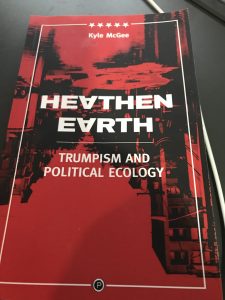
Another gorgeous book by Punctum!
[A copy-edited revision of this book review will appear in the journal Law and Literature]
Kyle McGee, Heathen Earth: Trumpism and Political Ecology. Earth: Punctum, 2017
During the bleak anticipatory interim between November 9, 2016, and January 21, 2017, Kyle McGee faced a “severest necessity” that suddenly “imposed” on him the composition of this short and resonant book. “This is not,” he notes in his Acknowledgments, “a book I wanted to write” (xiii) – nor, we might concur, a future in which we wanted to live. But a year into the Trumpocene, it’s good to have some guidance.
While we braced for the Inauguration, McGee, a writer, legal practitioner, and author of books on Latour and Delueze, shaped Heathen Earth as a stone to hurl into our present void. His angry opening salvo insists that Trump represents less aberration than the logical and horrific extension of elements of our present era that we fail to look at directly. At the “intersection of two vertigos” he identifies these symptoms as the “placelessness” imposed by globalization and the “landlessness” eroded by global warming. Rip away place and dissolve earth without building adequate responses to these dislocations, and you get – well, we know what we’ve got. Or at least we can feel it.
A broken system slouches into view in the wake of neoliberalism. Like many commentators, McGee treats Trump and Sanders as twin exposers of neoliberalism’s tired technofantasies. Trump’s retrograde response to globalized vertigo “sanctifies natus, birth, above all else” (59). Playing on the common compliment paid the leader by his fans, McGee reads being “down to earth” as “an unmistakeable reinscription of certainty into a world…that has become increasingly ambiguous” (60). In this reading, sovereignty emerges less from the Schmittian Decider than through a logic of exceptionalism and tribal / racial supremacy: “sovereign is that which divides the exception from the common” (62). To be included in the exception – to be white, male, rich, powerful, or to believe in the cultural myth of an orange-headed reality TV star who embodies those magic powers – allows uncertainty to be kept at bay, at least temporarily.
So far, so familiar: reading Trump as the ogre that ate the neoliberal consensus seems convincing but hardly shocking. But McGee pulls us one step past twitter radicalism by connecting Trump’s longstanding climate denialism with the collective agenda of both the man and his corporate allies. The project, McGee insists, is geocide, the destruction of Earth systems. Global warming in this view is not an accidental waste project of industrialization but a political gun to the head: “By way of geoengineered global warming, the climate itself can become the principal American weapon in the endless war on terror” (91). Or, put in different narrative terms, “the real Death Star is already here, in our abundant fossil fuel extraction” (98). What else does it mean to have a former Exxon CEO as Secretary of State? Geocide in the Trumpocene mobilizes the state to intensify global ecological crisis because “global warming [is] an unqualified capitalist good” (102). This soiled earth is “heathen” because in its “state of godlessness” it rejects all prior claims to mitigation or shared solace.
But there’s a twist: as Trumpian geocide breaks the world, it cracks open a window for quasi-Leibneizian geodicy. For McGee this vindication of “collective obligation” can only operate through “a pluralism of modes of experience and a multiplicity of arts of sensing and connecting” (104). He shows some sympathy for the non-technocrats demeaned by neoliberalism. “Climate and earth systems sciences,” McGree writes, “need non-scientific allies in literature and the arts, in law and politics, in economics and business, in journalism and media” (113). The total conceptual revolution he anticipates, however, suggests that an adequate response to the forces of Orange must include much more than new allies and new modes of thinking. “Be realistic,” he quips, “demand the impossible” (110).
We’ve heard calls for this sort of “new polity outside of the … state” (144) before, though McGee’s insistence that the right adjective for the state is “geocidal” raises the ecological stakes. The Fortescue-ean proposal that our legal structures be understood as analogous to the ligatures of a human body (124) underlines the fundamental reimagining of the duties of the state that McGee proposes. Alongside a recast politics he seeks a “radical rethinking of the Law of Nature” (125). His radicalism in places broadly parallels the more measured wishes of Jedidiah Purdy, whose After Nature (2015) asks for an “Anthropocene democracy” whose duties and pleasures would embrace humans and nonhumans while also redressing past exclusions. The “necessary couplings between legality and ecology,” McGee insists, “are still yet to be drawn” (127). He gestures toward Bruno Latour’s hopes, as stated in his Facing Gaia lectures (2015), for an international democratic order and an environmental commons to redress the placelessness and landlessness that birthed the Trumpocene. At the inchoate core of McGee’s “democratic weapons” are forces of community: “alliance, assembly, occupation, strike, protest, march, demonstration, above all appearance” (144).
He’s written a smart, angry, insightful, and provocative book to take with us to the barricades.